Publix, Produce for Kids Raise Funds For Feeding America Food Banks - Southeast Produce Weekly
Publix, Produce for Kids Raise Funds For Feeding America Food Banks - Southeast Produce Weekly |
- Publix, Produce for Kids Raise Funds For Feeding America Food Banks - Southeast Produce Weekly
- Health inspectors find a food truck with a big roach problem - WJXT News4JAX
- How A Healer, An Artist And A Chef Are Fighting For Black Food Sovereignty In South LA - LAist
- Bring an appetite: Food Truck Thursday returns to Niagara Falls - WGRZ.com
- Healthy House kicks off innovative 'Food to FoRx' program - Merced County Times
| Publix, Produce for Kids Raise Funds For Feeding America Food Banks - Southeast Produce Weekly Posted: 23 Jul 2020 01:44 PM PDT The annual Publix Produce for Kids campaign kicked off on July 17 with 12 produce partners supporting the 31 Feeding America member food banks in the Publix market area and a new focus on digital shopper communication. Newly designed Produce for Kids campaign signage appeared in produce departments at Publix Super Markets this July, launching the biannual campaign centered around consumption of produce and eating nutritious produce as a family. As an extra call out to the campaign, Produce for Kids founder, Shuman Farms, is featuring RealSweet onion bin wraps that promote the campaign and encourage shoppers to visit produceforkids.com/ Produce for Kids is entering into the 19th year working with Publix and its produce partners having raised more than $3.3 million for local families in need. Now more than ever, Feeding America member food banks are in need of support as COVID-19 has affected unemployment rates and the ability for kids to receive daily meals, often provided at school. According to USDA, one in nine people in the U.S. struggle with hunger. The biannual Produce for Kids campaign touts more than 7.6 million meals* donated to families in need and more than $720,000 raised for Feeding America programs that benefit families and children in Publix market areas.  "Now more than ever, food banks need our support. We are excited to join forces with Publix produce partners and customers to make an impact in local communities facing hunger," said Shuman Farms President John Shuman, who is the founder of Produce for Kids. "We've shifted the way we are speaking to Publix shoppers embracing our digital Publix audience in new ways." Extra digital elements will support this year's in-store efforts helping families connect the dots at home. Produce for Kids began a regular Friday Facebook Live cooking series in April with an average viewership of 10,000. In addition, recipes, podcast episodes, videos and blog content will be targeted to reach Publix shoppers through direct email outreach along with social media ads and posts. Shoppers are encouraged to share healthy recipes from their own kitchen and inspiration during the campaign using the hashtag #produceforkids. "At Publix, we recognize giving back to our communities is extremely important especially during these unprecedented times," Publix Director of Communications Maria Brous said. "We are proud to partner with Produce for Kids in this ongoing effort to help families achieve their wellness goals while supporting our communities."
The Publix Produce for Kids campaign, which will run through August 12, is supported by Ayco Farms, Coast Tropical, Del Monte Foods, Fresh Express, Lakeside Produce, Maries, Mission Produce, RealSweet, SUNSET, Village Farms, Wonderful Pistachios and Acosta Sales & Marketing. The Publix Produce for Kids partnership has raised more than $3.3 million to benefit local charities within the seven-state Publix footprint since 2002. *Every $1 donated to Feeding America helps secure at least 10 meals on behalf of member food banks. |
| Health inspectors find a food truck with a big roach problem - WJXT News4JAX Posted: 23 Jul 2020 06:50 AM PDT :strip_exif(true):strip_icc(true):no_upscale(true):quality(65)/d1vhqlrjc8h82r.cloudfront.net/07-23-2020/t_b96f53805e01448c959a7161d1fb4e26_name_file_1920x1080_5400_v4_.jpg) JACKSONVILLE, Fla. – In this week's restaurant report the Hum Hum Pita Wraps food truck was shut down by emergency orders from the Division of Hotel and Restaurants with the Department of Business and Professional Regulation. During a routine visit to the food truck on July 16, an inspector issued a stop-sale on all inventory in the mobile unit. The report shows the food was not in a wholesome, sound condition. 6 dead roaches were also found, one being inside the ice machine, but it gets worse. Upon opening a cabinet underneath a hand-washing sink in the truck, the inspector found 40 live roaches. Further, the inspector noted employees were not using the hand-washing sink since there were objects in the sink blocking access. The items were removed, paper towels were provided and the violations were corrected on site. At a follow-up inspection the very next day, all the previous violations had been resolved, except for the live roaches. The inspector cited Hum Hum Food Truck with a single high priority violation. The food truck had to remain closed. Four hours later, the inspector returned. The roaches were gone, and the food truck received a perfect inspection, reports show. The food truck was allowed to reopen. RESTAURANT REPORTS: Failing inspection | Follow-up inspection | Final inspection News4Jax monitors restaurant inspections in District 5 for the Division of Hotels and Restaurants every week. District 5 covers Alachua, Baker, Bradford, Clay, Columbia, Dixie, Duval, Flagler, Gilchrist, Hamilton, Lafayette, Levy, Marion, Nassau, Putnam, St. Johns, Suwannee, and Union Counties. |
| How A Healer, An Artist And A Chef Are Fighting For Black Food Sovereignty In South LA - LAist Posted: 23 Jul 2020 07:00 AM PDT 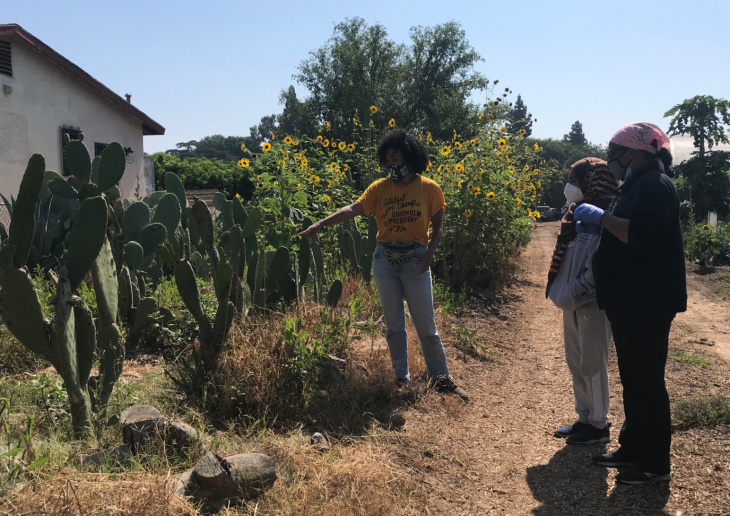 Our news is free on LAist. To make sure you get our coverage: Sign up for our daily newsletters. To support our non-profit public service journalism: Donate Now. "Bananas are like humans, they only bear fruit every nine months," says Ali Anderson as she points to a collection of trees. It's a warm Saturday morning and she is leading three prospective gardeners and volunteers around Huerta del Valle, a three-acre community garden in the middle of Ontario. The garden, located next to Bon View Park, is a lush oasis of sunflowers, cacti and callaloo stalks amid the concrete sprawl of the Inland Empire. As we round the corner past the chamomile blossoms, a shiny green june bug flies into Anderson's hair. Medina Moss catches the beetle and hands it to her 15-year-old daughter. 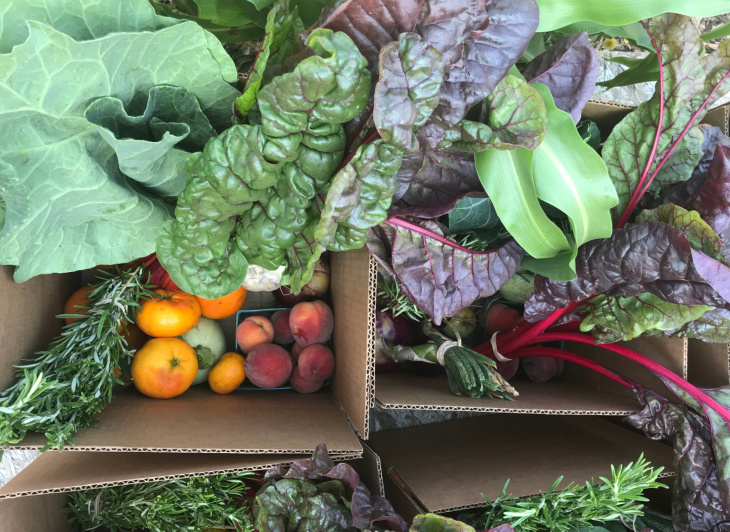 "Here," she says, "if you want to learn how to farm, you have to get used to this." 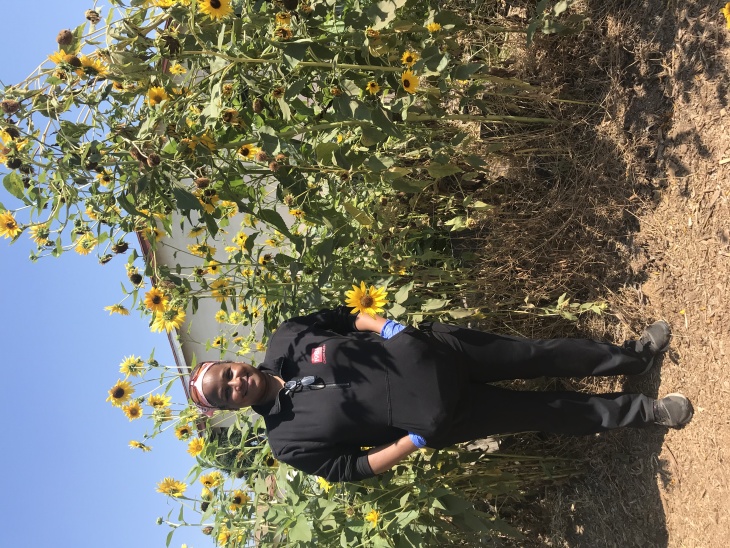 Moss, a 49-year-old artist and illustrator, made the 39-mile drive from her home in downtown Los Angeles to pick up five boxes filled with kale, swiss chard, peaches, oranges, squash and rosemary. Anderson gives away the produce as part of Feed Black Futures. A collaboration with Essie Justice Group, a nonprofit that advocates for women with incarcerated family members, the grassroots project relies on community donations to provide weekly boxes of fresh food to Black women. The organization also cultivates future Black farmers and supports gardens in transitional housing. It's one of several mutual aid projects — a term coined by Peter Kropotkin in the late 1800s to describe direct, communal actions — led by Black chefs, food activists and ordinary people to ensure their communities have access to healthy food. It was a challenge long before the coronavirus pandemic. Since then, it has become a mode of survival. At a baseline level, people who live in low-income zip codes have 25% fewer supermarkets than people who live in middle-income neighborhoods. The produce selection in these areas is often scarce, lower quality and more expensive so you're paying higher prices for bruised or expired fruits and veggies. Now, throw in a global pandemic. Food banks are seeing an epic level of need and applications to CalFresh, California's food stamp program, have doubled since March. A growing number of Black activists believe it isn't enough to rely on government assistance to solve these problems. Instead, they want to start at the root of the problem — investing in Black-owned farms so they can feed Black people throughout Southern California. These efforts are about food sovereignty but they're about more than that. They attempt to address decades of racist practices in the food system — from discriminatory lending and over-policing to redlining and lack of support from the U.S. Department of Agriculture — that have shrunk the number of Black farmers in the U.S. to 2% of the total number of farmers, down from a high of 14% in 1910. In Los Angeles, three new voices in food activism — a healer, an artist and a chef — are taking three different approaches to fighting food insecurity and sowing the seeds of Black food sovereignty. 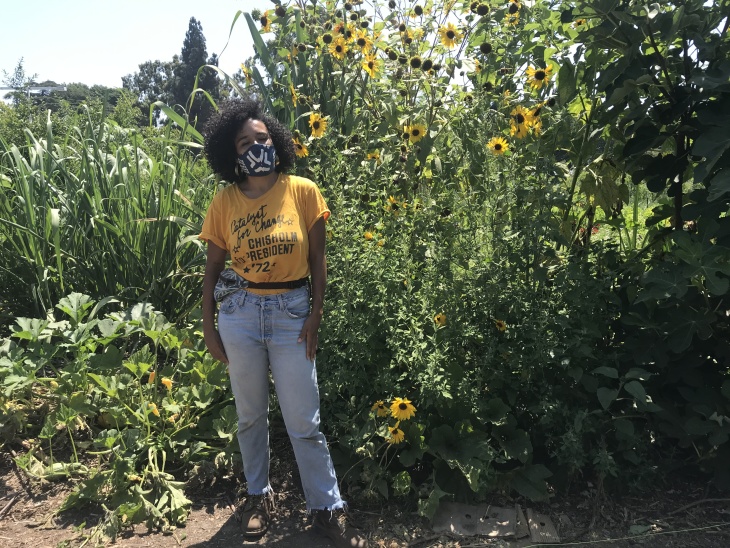 Since the beginning of June, Ali Anderson has spent seven hours each week, preparing approximately 30 to 60 produce boxes for Essie's clients, Black women and caregivers who affectionately call each other sisters. Many of these women are unable to access fresh fruits and vegetables on the regular. Supermarkets are often far away and they don't have reliable transportation. The quality of such produce is often less than stellar. And sometimes, rent and childcare take priority so healthy food becomes an afterthought. Food activist Karen Washington uses the term "food apartheid" to describe this confluence of factors. She prefers that phrase to the more common term "food desert," because she believes it highlights the systemic racism and inequality that makes healthy food less accessible to people in low-income and largely Black and Brown neighborhoods. For Medina Moss, an Essie sister for about a year, that Saturday in June was the first time she had visited a community garden in years. The trip offered a pleasant break from quarantine. More than that, she says as a Black woman, it reawakened her relationship to the land. "I feel like crying," Moss said as she stood in a field of sunflowers after the tour ended. "This is what I'm trying to do." Moss plans to enroll in Huerta's six-month farmer training intensive, which pairs hands-on harvesting experiences with classes in food sovereignty. "I want to give back to my community. I'm interested in repairing us as Black folks because we're the priority right now," Moss says. For Anderson the pandemic presented the perfect moment to get to the roots of health in the Black community — and that starts with what people eat. 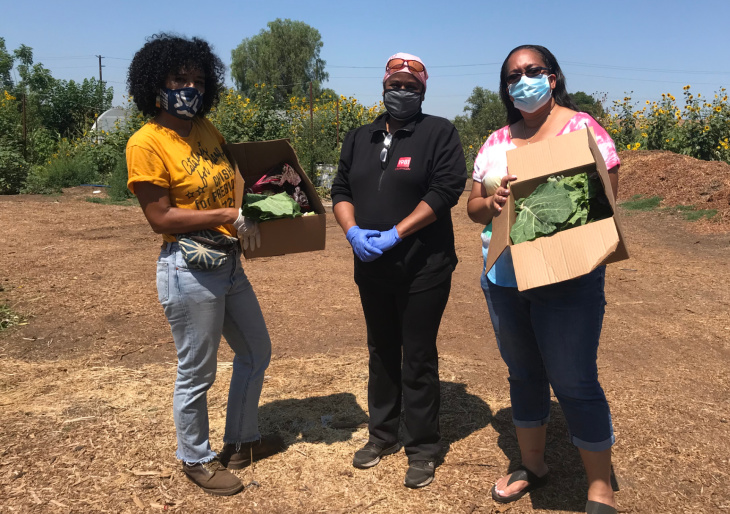 Anderson, 32, grew up in Claremont first studying at USC before pursuing a Masters in public health in Atlanta. Later, in New York, she became a community health organizer, prison abolitionist and doula. Last summer, while completing a one-week farming intensive at Soul Fire Farm, a BIPOC community farm in Albany, New York, Anderson began to draw connections between the fights for reproductive justice, eliminating prisons and food sovereignty. "Abolition is about presence, not absence," Anderson says. "The creation of regenerative food systems makes it possible for people to own their own land and to feed themselves. The more we invest in communities, the less need there will be for monitoring and incarceration." After spending two months on a permaculture farm in Jamaica, Anderson returned to Claremont near the start of the COVID-19 quarantine, keen to continue her food work. 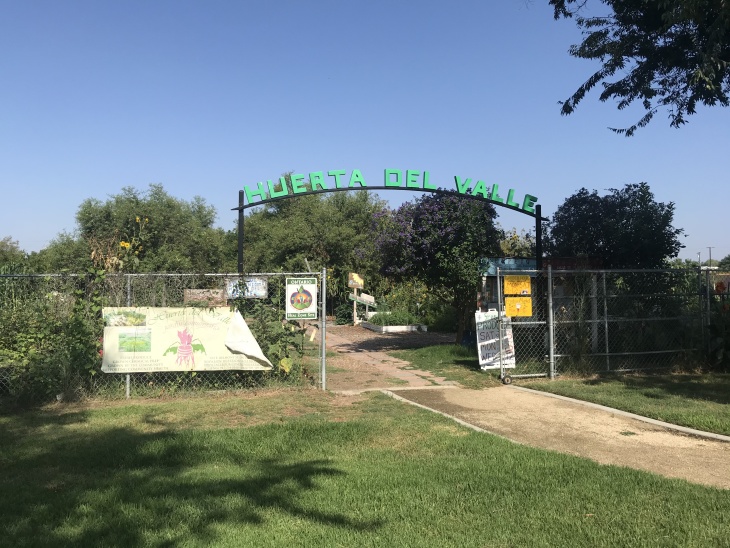 She began volunteering at Huerta del Valle, planting, harvesting and working at their weekly farmer's market. While picking bushels of leafy greens and putting together CSA boxes, Anderson thought there must be a way to get the produce to the people who needed it most. A friend connected her to the advocates at Essie. With the help of four Huerta volunteers, Anderson now packs nearly 100 boxes a week with an array of seasonal fruits and veggies. Then, she drives from the Inland Empire across South L.A. to deliver each box. When recipients wanted to see where their food was coming from, Anderson provided gas money so they could visit the garden. As more Essie sisters visit the farm, Anderson hopes to connect them with Black farmers, beekeepers, growers and food activists. Her goal is lofty — to help nurture the next generation of Black agriculture students, especially those returning from incarceration. "This is such an example of divesting from capitalism," Anderson says. "When we take care of each other, when we give half of our very little to other people, it's because we're all connected in this collective struggle."  At 8 a.m. on Friday mornings, a line forms around the bright yellow Boys and Girls Club at Nickerson Gardens, a public housing complex in Watts. The gymnasium is packed with 700 or so bags of non-perishable groceries. In the lobby, volunteers unload dozens of boxes of fresh produce and lay out hot trays of macaroni, turkey and dressing. 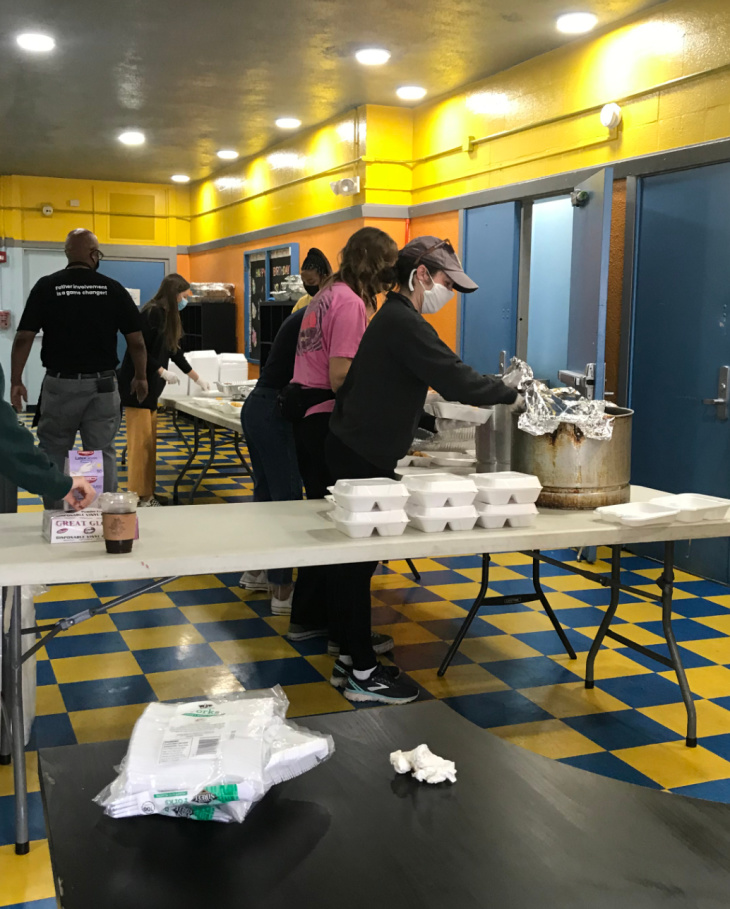 For the last 16 weeks, the Watts Community Corps has stepped up to provide groceries and hot meals for locals. Founded a year ago as an after-school, youth boxing program, the nonprofit shifted its focus when founder Tanya Dorsey noticed that kids were showing up hungry. When COVID-19 hit, Dorsey says she and her Watts Community Corps colleagues pooled their personal money to bring hot meals of chicken and rice to the young boxers. They served 70 kids in the first two weeks. As of late June, they've fed almost 500 people, adults and children, thanks to a partnership with summaeverythang. Founded by Lauren Halsey, a 33-year-old artist known for transcendent architectural installations such as "The Crenshaw District Hieroglyph Project" and "we still here, there," the community center develops what Halsey calls "intelligence in the hood." From tutoring to sports to making art, it truly offers some of everything. The pandemic forced her to reflect on her artistic practice. A Watts native, Halsey had planned to open her center next to her studio in South L.A. later this summer. When coronavirus halted those plans, she decided to put her fantastical architectural proposals on pause and redistribute the centers' funds to address a more urgent need. "I thought how powerful and on time it would be to figure out how to get food to families' homes," Halsey says. 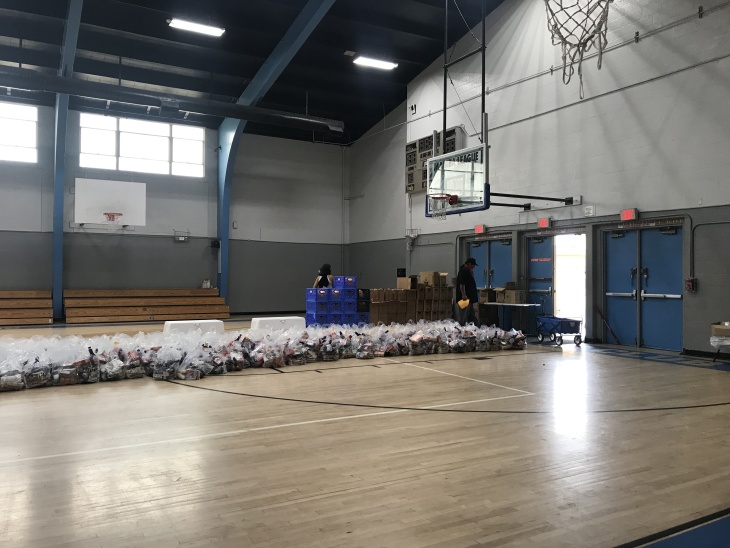 She drew inspiration from Fannie Lou Hammer's Freedom Farm, which provided land to Black farmers from 1969 through the '70s, and the Black Panther Party's Free Breakfast For School Children program in the 1970s. In South L.A., a roughly 50-mile patch with 28 neighborhoods of mostly Black and Latinx residents, people have few options for nutritious food. A 2010 study found that the region has only 60 full service grocery stores for nearly 1.3 million residents. Compare that to 57 stores in West Los Angeles with its 11,150 residents. The obesity rate in South L.A. hovers around 35% in adults, significantly higher than the 10% average in West L.A. and the 22% average in the rest of L.A. County. When She's Not Bringing 'Produce To The People,' Olympia Auset Wants To Open A Full Time Food Oasis Halsey assembled a team of friends and family to pack and haul between 600 to 1,000 boxes a week of free organic produce. That first week in May, she was overwhelmed by how many people turned out to get the boxes. Now, she and her team distribute curly kale, beets, collard greens, melons and grapefruits along with face masks every Friday at Nickerson Gardens, the Watts Civic Center and a few other nearby locations. 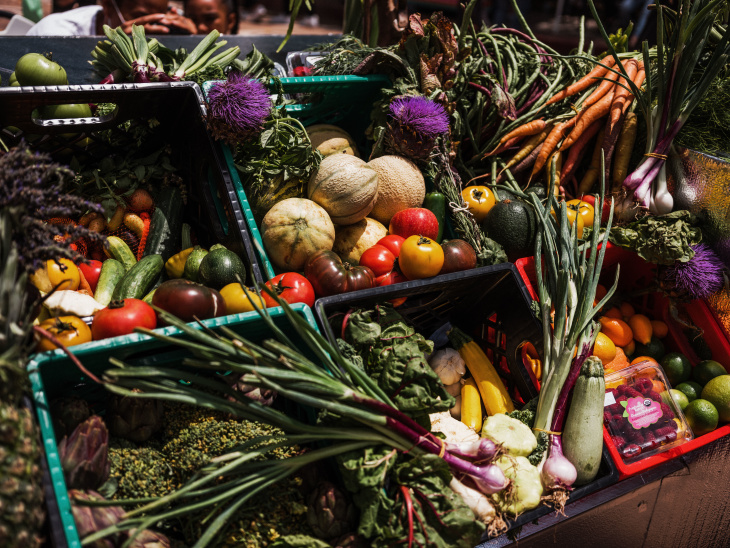 She hopes to make the boxes "as excessive" as she can afford. Initially, Halsey reached out to a number of large food distribution warehouses and farms around Southern California. These days, she's sourcing most of her produce from small farms in Los Angeles County. She's eager to support more local Black farmers and provide a long-term path to bring organic, pesticide-free food to South L.A. "You can just taste the pesticides," Halsey says. "That's a problem and a decision. It's not only a disservice, it's a type of violence to have to make that decision, for Black and brown people to ingest and eat what is given to us." 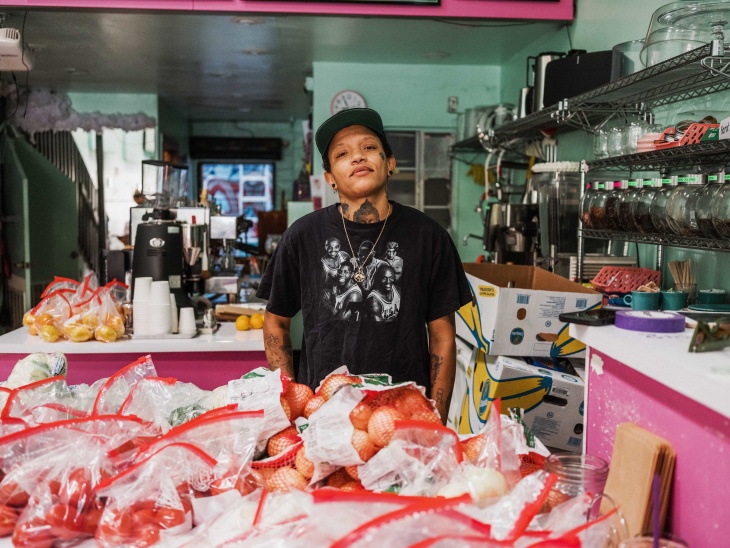 In Koreatown, chef Kat Williams is working to make sure queer and trans Black people — a population particularly vulnerable to COVID-19 along with homlessness, unemployment, discrimination and violence — have access to healthy food and that they get to experience a sustained sense of food security. After receiving their stimulus check, the Jamaican nonbinary chef, who runs the food pop-up Noisy Library, spent $200 to make a few meals for other queer Black people. After Williams posted on Instagram offering to do it again, the donations started rolling in. Last month, Williams was able to donate 200 meals of jerk chicken, rice and peas, vegan vegetable curry and sugar cookies. 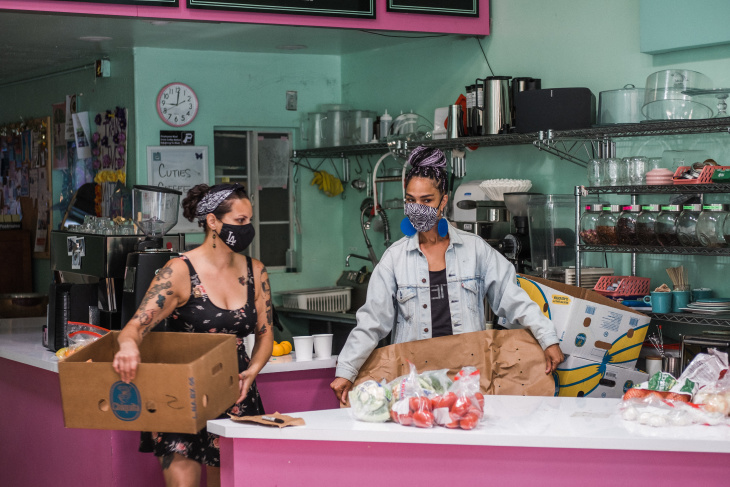 Williams has partnered with Nourishably, a new grocery delivery project, to provide 75 meals to homeless people in late July. Through a live cooking tutorial at the Eastside vegetarian restaurant Jewel, they've raised funds for The Okra Project, which provides Black trans people with meals cooked by Black trans chefs. Williams also set up a mutual aid fund to cover living expenses for Black queer and trans people. 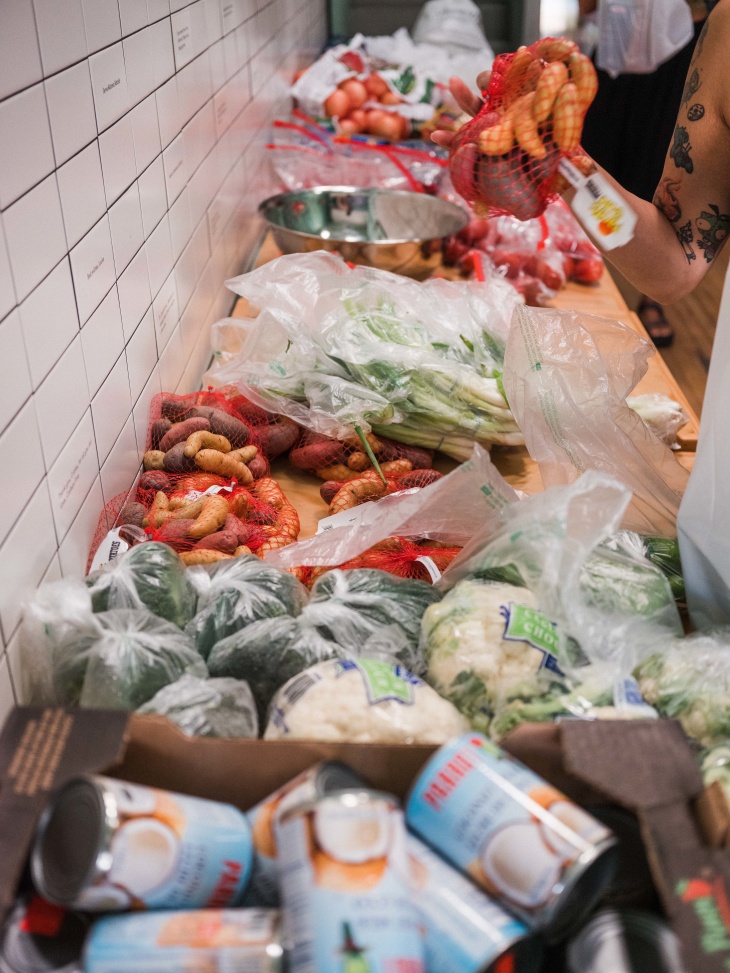 For Williams, who has personally benefited from mutual aid, providing for their community is an act of service and a way of redistributing wealth, the bulk of which has come from white supporters. "I think it's a mutual realization of 'Yo, you got me, I got you,'" Williams says. "We shouldn't be having to ask for resources that should just be available." As part of a Juneteenth drive, Williams purchased groceries for 13 households and assembled Black Joy Boxes — self-care packages of soaps, candles and crystals from Black-owned businesses. With a small team of volunteers, Williams was able to deliver food to queer and trans folks across the city. Although it's a small scale operation run out of their home, Williams believes gestures of community support, big and small, show the strength of the Black community and the potential that exists outside traditional avenues of aid. In the last few months, community-driven aid has been a lifeline to many Black queer and trans people, from fundraisers to purchase chest binders, to efforts to secure long-term housing for Black trans women. Access to good, healthy food goes beyond filling a physical need. Williams believes it can be transformative. "It's a heavy time and mutual aid is such an amazing concept," Williams says. "I've gotten a lot of support from Black folks, especially emotionally. There's so much pain and everybody's feeling grief in that same way. Right now, we're all in it, trying to heal together." 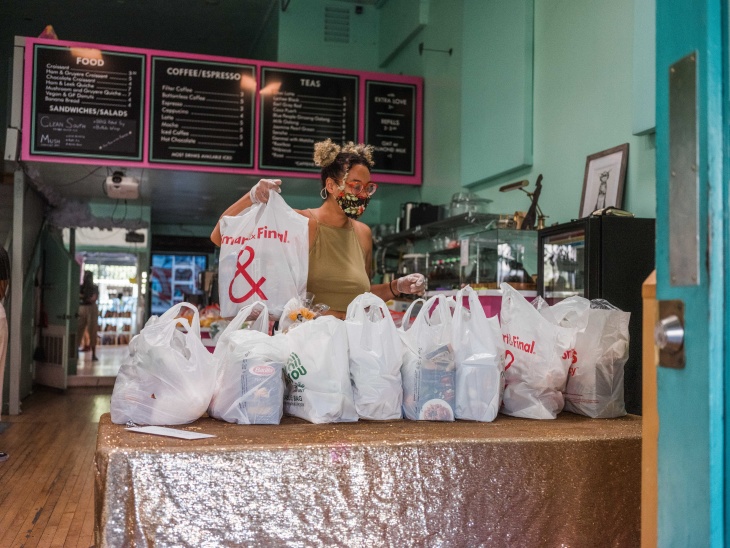 |
| Bring an appetite: Food Truck Thursday returns to Niagara Falls - WGRZ.com Posted: 23 Jul 2020 02:21 PM PDT 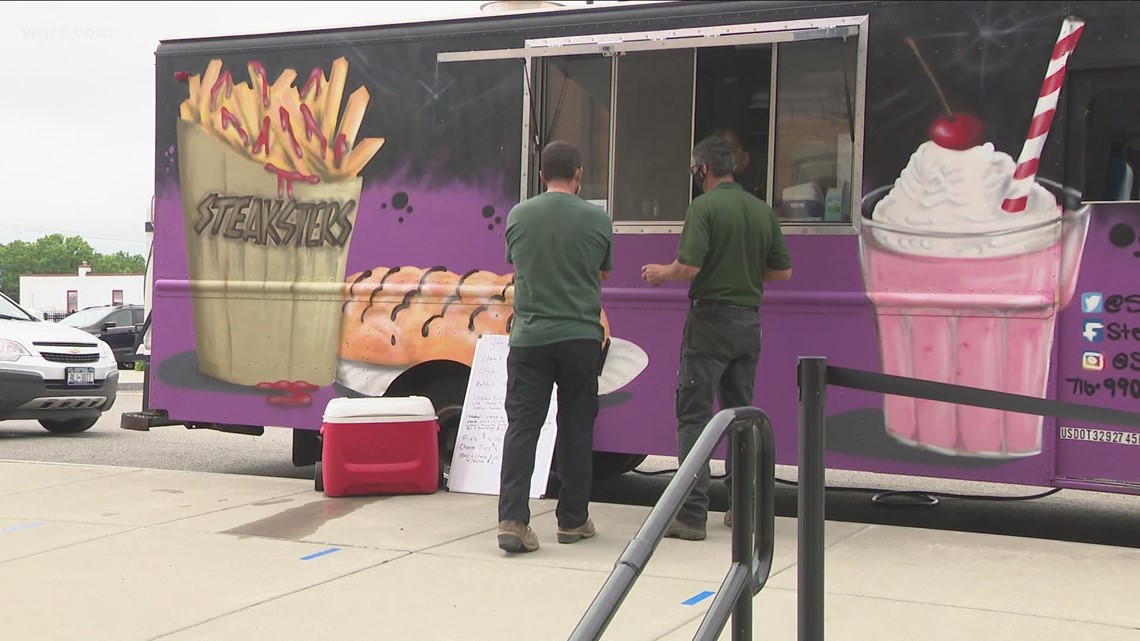 NIAGARA FALLS, N.Y. — A summer staple is back: Food Truck Thursday in Niagara Falls. This is the third season of the weekly lunch series. It runs every Thursday through September 10 from 11 a.m. to 1:30 p.m. at the Niagara Falls Train Station on Depot Avenue. Today's food truck was Steaksters. Some of the weeks will feature local live music. Anyone who goes is asked to follow COVID-19 safety guidelines, which are posted at the event as well. |
| Healthy House kicks off innovative 'Food to FoRx' program - Merced County Times Posted: 23 Jul 2020 08:00 AM PDT
Doctors don't usually write prescriptions for fresh food. An innovative program, dubbed "Food to FoRx," is changing that perception. In partnership with the Family Medicine Residency Program at Dignity Health, the Merced County Food Bank, the "Make Someone Happy" food truck, the Central California Alliance for Health, and the Merced County Public Health Department, Healthy House kicked off its this prescription produce program on Monday. Resident doctors at the Family Care Clinic are writing prescriptions for fresh produce for their Medi-Cal patients who have limited access to nutritional food. The refrigerated truck carrying the produce will be parked at the clinic, at 315 E. 13th Street, Merced, on Mondays and Thursdays from 2 p.m. to 6 p.m. Healthy House staff also will be on site to distribute recipes, cold water, and lists of food access sites, as well as provide interpreting. Masks, nitrile gloves and other COVID-19 precautions will be in place. "South Merced is actually a food desert area, which means it does not have easy access to fresh fruits and vegetables," said Candice Adam-Medefind, Healthy House executive director. "We are glad to work with resident doctors who are enthused about writing prescriptions to fill this need." Much of the produce slated for distribution comes from the 100-bed community garden at Shepherd of the Valley Lutheran Church. Many individuals, businesses, and institutions, including Merced County Supervisors Lee Lor and Lloyd Parreira, the Merced College Ag Dept., Master Gardener consultant Marc Medefind, Lee's Market, WalMart, the Merced County Public Health Dept., the City of Merced, Jeff Rivero and many Hmong elder gardeners have contributed to this effort. The garden has been supervised by Healthy House staffers Anna Tai Owens, Grace Vasquez and Emilio Guzman. A lot of the food transportation from the Food Bank and other locations is supported by the Make Someone Happy truck. "We are delighted to help in anyway we can," said Don Bergman, who along with his wife Nancy use the truck to spread fresh produce and nutritional information through this region's underserved communities. A goal of the Food to FoRx program is to improve participants' current health by providing them with access to healthier food. And, by introducing children to healthy eating early on, it may also boost their long-term wellness. According to the U.S. Department of Agriculture, well over 10 percent of U.S. households are food insecure. "Food prescription programs like this are cropping up around the country," said Sandra Lopez, Healthy House staffer. "Most of them are designed to get fresh fruits and vegetables and other healthier foods into the hands of children and adults who can't afford to buy them, or who live in areas where healthy foods are hard to find. "People may be more likely to make a behavior change if the recommendation comes from their healthcare provider, as part of a treatment plan for conditions such as diabetes, heart disease, high blood pressure, or obesity," Lopez said. A Food to FoRx prescription needs to come from a primary provider, and the order is good for four weeks. As of Monday, 42 local residents were signed up to receive the food prescriptions. For further information, call Healthy House at 724-0102.    |
| You are subscribed to email updates from "food" - Google News. To stop receiving these emails, you may unsubscribe now. | Email delivery powered by Google |
| Google, 1600 Amphitheatre Parkway, Mountain View, CA 94043, United States | |
 Publix customers can identify partner brands through in-store signage, featuring the Produce for Kids and Feeding America logos in all Publix produce departments. Signage directs customers to
Publix customers can identify partner brands through in-store signage, featuring the Produce for Kids and Feeding America logos in all Publix produce departments. Signage directs customers to